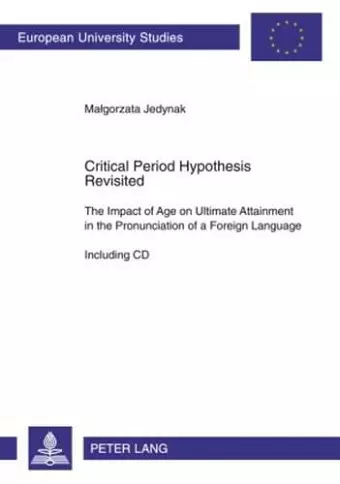Critical Period Hypothesis Revisited
The Impact of Age on Ultimate Attainment in the Pronunciation of a Foreign Language - Including CD
Format:Paperback
Publisher:Peter Lang AG
Published:23rd Mar '09
Currently unavailable, and unfortunately no date known when it will be back

This book explores the Critical Period Hypothesis, examining factors influencing adult language learners' ability to achieve native-like pronunciation.
In Critical Period Hypothesis Revisited, the author delves into the ongoing debate surrounding the Critical Period Hypothesis (CPH) and its implications for mastering native-like pronunciation in foreign languages. The book presents a thorough examination of both sides of the argument, showcasing research that involves adult learners of English and Polish. Through detailed case studies, it reveals how some individuals have successfully acquired pronunciation skills that allow them to be perceived as native speakers of their target languages.
The text further explores various factors that contribute to successful language acquisition, including the learning environment, duration of study, and specific training in phonology and phonetics. By analyzing these elements, the author provides insight into how they interact to influence the outcomes for learners. The findings challenge traditional views on the CPH, suggesting that age may not be the sole determinant of language proficiency.
Ultimately, Critical Period Hypothesis Revisited serves as a valuable resource for linguists, educators, and language learners alike. It encourages a reevaluation of established beliefs about language learning and highlights the potential for adult learners to achieve remarkable proficiency, regardless of age. The book is not just an academic discourse; it is a call to recognize the capabilities of adult language learners and the diverse pathways to achieving fluency.
ISBN: 9783631575284
Dimensions: unknown
Weight: 380g
264 pages
New edition